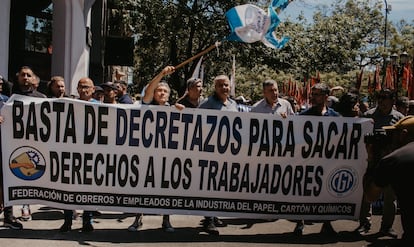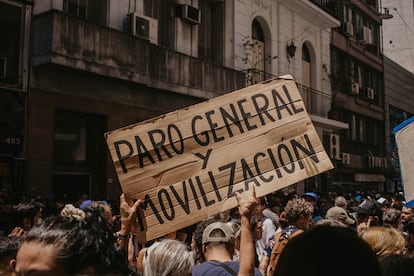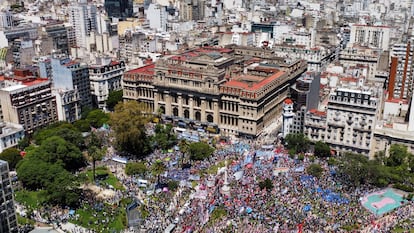Argentine President Javier Milei proposes law punishing protest organizers with up to six years in prison
The measure is part of a so-called ‘omnibus law’ containing over 600 articles that would grant legislative powers to the government in economic, fiscal, taxation, and electoral matters

Ultra-right-wing Argentine President Javier Milei on Wednesday presented Congress with a bill declaring the country in a state of “public emergency” and including 664 articles that fundamentally alter the roots of a good part of Argentina’s political, social and economic structure. The “omnibus law,” as it is called due to its scope and variety of topics, involves the transfer to the government of broad legislative powers in economic, financial, social security, fiscal, health and even electoral matters. The bill, which will be handled in extraordinary congressional sessions, also includes a stiffening of sanctions against social protest. Milei proposes that any “intentional and temporary congregation of three or more persons” be considered a demonstration, punishable by up to six years of imprisonment, if it impedes free transit or the provision of public services.
The text sent to Congress — Milei’s most forceful policy initiative since he took office earlier this month — warns that authorities must be notified of any public demonstration in advance and that the Ministry of Security has the power to oppose the protest or propose changes. In addition, social organizers will have to declare who is responsible for the calls to mobilization so that they can be identified in the case that they warrant criminal sanctions. The bill gives legal form to the anti-protest protocol signed two weeks ago by the Minister of Security, Patricia Bullrich.
The bill comes on the heels of other actions by Milei’s government that have raised social discontent during the first three weeks of his presidency. First came a decalogue of economic measures announced by the Minister of Economy, Luis Caputo, who devalued the Argentine peso by 50% and announced the elimination of subsidies on transportation and energy as of January, among other measures. This week, the government also terminated the contracts of at least 5,000 state employees after signing a decree with hundreds of reforms which, according to the executive’s reading, did not need to go through Congress.
Among the list of reforms proposed by the legislative project, pompously called the Law of Bases and Starting Points for the Freedom of Argentines, is the empowerment of the government to privatize 50 public companies, the end of primary elections in political parties and a restructuring of the Chamber of Deputies that facilitates the addition of deputies to second and third electoral forces, as at this moment is the case of Milei’s party, La Libertad Avanza. The law, if approved, advances all kinds of issues. Free public universities, for example, will be able to charge foreign students for their education; it also targets large fortunes which have been evading taxes for years.
Milei’s proposal would declare Argentina in a situation of “public emergency” until December 31, 2025, a period that is extendable for a further two years, thus covering his entire term of office. Under this situation of alleged public emergency, the government is enabled to assume powers that correspond to the legislative branch. The Argentine Constitution prevents such transfer of powers “except in specific matters of administration or public emergency, with a fixed term for its exercise and within the basis of the delegation established by Congress.”

Union Protests
“Set the date! Set the date!” was the cry Wednesday in downtown Buenos Aires during a demonstration called by the General Confederation of Labor (CGT) against the first measures introduced by Milei’s government. Protestors demanded a general strike in rejection of the decree imposed by the president, which contains over 300 reforms that dismantle the Argentine state. Hours later, the government presented a bill with almost 700 articles which introduce profound modifications in the legislation, causing further social discontent. The confederal central committee of the CGT will meet Thursday to evaluate the next steps against the far-right reforms. On the table is the possibility of calling a general strike.
The main labor unions in Argentina, the CGT and the Argentine Workers’ Central Union (CTA), will coordinate to continue defining a course of action. The unions consider they have three ways to address the government’s measures: the judiciary, Congress, and the streets. After the latest government announcements, the call for a strike appears to be closer. Rodolfo Aguiar, national secretary of the State Workers Association, which is part of the CTA, believes that it is “a positive fact” to have seen the Plaza Lavalle in the capital “overflowing” Wednesday. “The level of conflict is growing and the conditions for a general strike are in place,” the unionist assured EL PAÍS.
Aguiar, however, has called on workers to be “patient” about the call for a general strike. The unions are “measuring the temperature,” as sources pointed out to this newspaper, and defining their strategies with prudence. “The workers expect their representatives to be able to join forces and we hope that the central leaders are up to the circumstances,” said Aguiar, who pointed out that “time is running in Milei’s favor” because the decree of urgent necessity imposed by the president enters into force on Friday. The package of reforms can be stopped in Congress or in the courts, but if that does not happen, the measures will become law.
For left-wing parties and social movements, however, the call for a general strike is pressing. These supported the demonstration Wednesday but as an independent column. There, the signs held up by demonstrators called for a “national and active strike.” “We came to demand a national strike and a plan of struggle, which corresponds to the seriousness of the situation,” said Eduardo Belliboni, leader of the Polo Obrero worker’s movement, during the rally. For Guillermo Kane, legislator and leader of the Partido Obrero (Workers’ Party), the march was no more than “symbolic.” “We need substantive action,” said the politician. “The CGT, which has not held a strike in four years, has not been playing a role of active defense of the workers.”
The steps to be taken by the unions are expected to be announced imminently. Union leaders said they will try to move forward “with the highest possible levels of unity.” Different organizations, movements, and political parties have already announced that they will continue to mobilize in the face of measures that they consider a “subjugation” of their rights. In recent weeks, various organized associations and self-convened groups of citizens have organized assemblies all over the country, staging pot-and-pan protests and setting up soup kitchens to offer food to people in need. Milei’s far-right government is facing a long period of mobilizations and popular resistance, but it is also confident of the support it received at the ballot boxes.

Sign up for our weekly newsletter to get more English-language news coverage from EL PAÍS USA Edition
Tu suscripción se está usando en otro dispositivo
¿Quieres añadir otro usuario a tu suscripción?
Si continúas leyendo en este dispositivo, no se podrá leer en el otro.
FlechaTu suscripción se está usando en otro dispositivo y solo puedes acceder a EL PAÍS desde un dispositivo a la vez.
Si quieres compartir tu cuenta, cambia tu suscripción a la modalidad Premium, así podrás añadir otro usuario. Cada uno accederá con su propia cuenta de email, lo que os permitirá personalizar vuestra experiencia en EL PAÍS.
¿Tienes una suscripción de empresa? Accede aquí para contratar más cuentas.
En el caso de no saber quién está usando tu cuenta, te recomendamos cambiar tu contraseña aquí.
Si decides continuar compartiendo tu cuenta, este mensaje se mostrará en tu dispositivo y en el de la otra persona que está usando tu cuenta de forma indefinida, afectando a tu experiencia de lectura. Puedes consultar aquí los términos y condiciones de la suscripción digital.








































